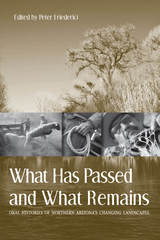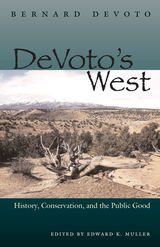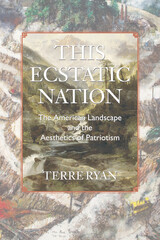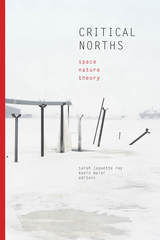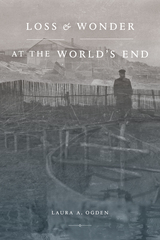DeVoto’s West: History, Conservation, and the Public Good
Ohio University Press, 2005
Cloth: 978-0-8040-1072-6 | Paper: 978-0-8040-1073-3 | eISBN: 978-0-8040-4014-3
Library of Congress Classification GE155.W47D4 2005
Dewey Decimal Classification 333.720978
Cloth: 978-0-8040-1072-6 | Paper: 978-0-8040-1073-3 | eISBN: 978-0-8040-4014-3
Library of Congress Classification GE155.W47D4 2005
Dewey Decimal Classification 333.720978
ABOUT THIS BOOK | AUTHOR BIOGRAPHY | TOC
ABOUT THIS BOOK
Social commentator and preeminent Western historian Bernard DeVoto vigorously defended public lands in the West against commercial interests. At his death in 1955, DeVoto had won both the Pulitzer and Bancroft prizes. But he was most famous for his eloquent writing that advocated conservation of America's prairies, rangeland, forests, mountains, canyons, and deserts.DeVoto's West: Essays on History, Conservation, and the Public Good showcases the complexity, depth, and breadth of DeVoto's thinking. Editor Edward K. Muller introduces these twenty-two essays (many of which originally appeared in Harper's renowned column The Easy Chair) that passionately and coherently advocate federal control for vast tracts of public land. DeVoto addressed many issues, including the plundering of resources by absentee eastern corporations, Westerners' conflicted relationship to exploitation, and the degradation of the national parks. He believed that conservation of natural resources in the West required government control of public lands against livestock associations, timber interests, and their congressional allies who plotted the privatization of the national forests and the extraction of resources in the national parks.DeVoto's West collects the best of DeVoto's conservation pieces for the first time. It will introduce a new generation to prose that has retained its relevance and remains a remarkably current and timely argument for protecting public lands. Bernard DeVoto was born in Ogden, Utah, in 1897. He spent his adult life in the East, first teaching English at Northwestern University, Chicago, then living in New York, and finally settling in Cambridge, Massachusetts. He is the subject of an acclaimed biography, The Uneasy Chair, by Wallace Stegner.
See other books on: Conservation | Conservation of natural resources | Environmental degradation | Environmental protection | Public lands
See other titles from Ohio University Press

